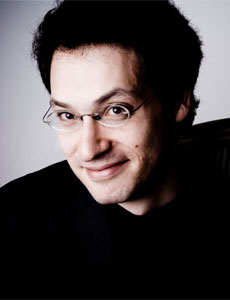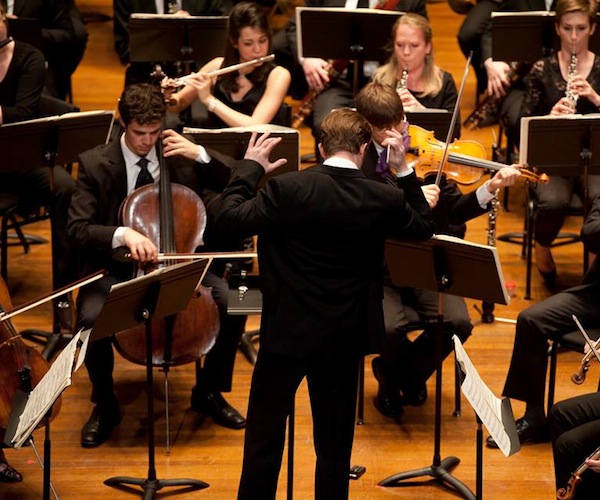Concert Review: Discovery Ensemble Plays Mozart, Ligeti, and Sibelius
Discovery Ensemble is one of Boston’s great musical treasures, a group that consistently reminds us not only that the music they play is important, but why that’s the case to begin with.
By Jonathan Blumhofer

Israeli pianist Shai Wosner — a keyboard player with fluid technique and a marvelous sense of the singing, melodic line.
It’s no secret that Boston’s most reliably exciting orchestra is Courtney Lewis’s Discovery Ensemble. Made up primarily of recent grads from local conservatories, it’s a group that, despite its youth and turnover rate (this season features quite a few new faces, especially in the principal string chairs), consistently delivers playing of great energy, spirit, unity, and depth.
To begin their sixth season this past weekend, Lewis and the Ensemble essayed a program that emphasized one of the most familiar musical elements, melody. Simple as such a premise might sound, Sunday’s concert at Jordan Hall, which featured music by Mozart, György Ligeti, and Sibelius, ended up demonstrating just how difficult it can be to define that seminal musical characteristic. And, if you weren’t interested in focusing too much on the didactic side of things, the performance, itself, offered ample rewards for the casual listener.
Pianist Shai Wosner was one of them. He’s a keyboard player with fluid technique and a marvelous sense of the singing, melodic line, as he demonstrated with aplomb in Mozart’s turbulent Piano Concerto no. 20. One of only two concerti Mozart wrote in a minor key, the D minor 20th plumbs some marvelously ambiguous depths and doesn’t shy away from mighty, explosive outbursts. It also contains some of the tenderest, most expressive music in Mozart’s canon, especially in the slow second movement.
On Sunday, Wosner found the drama in the big first movement, but not only in the loud moments: its many quiet passages were charged with a strong, haunting focus that resulted in a remarkably satisfying interpretation. The famous slow movement continued that trend, with a reading that balanced lyricism and passion in equal measure. Perhaps the most striking moment in the finale was Wosner’s performance of the cadenza (his own – he played Beethoven’s in the first movement), a brilliant, idiomatic bit of writing that paved the way for the music to transition from darkness to light.
Throughout the performance, Lewis and the Ensemble provided a sensitive accompaniment, brawny when called for but often restrained (in the good way). Though a reduced ensemble, the orchestra never sounded small, delivering a reading that married the punchy excitement of a period ensemble with the full-bodied sonorities of a modern orchestra.
Where Mozart’s melodic writing tends towards the long, lyrical line, Sibelius’s Sixth Symphony, which closed the concert, is, melodically, of far more fragmentary quality. Indeed, it’s a symphony that, at more than one point, simply stops in its tracks, seemingly mid-thought.
Sunday’s performance began tentatively – there was a moment-to-moment quality to the playing in the beginning of the first movement that didn’t bode well – but the Ensemble soon righted itself. The last three movements were rich with detailed character and nuance, the third movement, especially, delivering Sibelius’s strict rhythmic writing with taut precision.
Lewis and the Ensemble also, by the second movement, really dug in to Sibelius’s distinctive orchestral sound. Among many fine solo (and sectional) contributions throughout the afternoon, oboists Zachary Boedling and Caroline Scharr stood out, realizing their parts with plangent coolness.
What Sibelius fractured, melodically, Ligeti atomized. His Melodien, written in 1970, is made up of webs of often very active sounds that come apart before reuniting in new combinations. As with all Ligeti’s mature work, there’s a strong sense of an underlying dramatic trajectory in Melodien – it’s music that starts in one place and ends in another – a trait it holds in common with the other pieces on this program.
It can be a powerful piece to hear live, and Lewis and the Ensemble captured its broad gestures well. The opening section and the octaves in the middle of the work stood out for, respectively, their diaphanous skittishness and eerie clarity, and Bianca Garcia and Nicholas Loh brought fulgent color to their piccolo/celesta duet. Still, I missed an overall sense of the music’s mystery and otherworldliness: there were some balance issues and a generally tentative quality to several of the work’s important solo passages.
Even so, Melodien proved the afternoon’s unifying thread, sandwiched as it was between the Mozart and Sibelius: kudos to Lewis and the Ensemble for programming it.
Three more concerts remain on Discovery Ensemble’s 2013-14 concert calendar: dates in November, March, and April, all at Jordan Hall. If, for whatever reason, you haven’t yet availed yourself of the Ensemble’s programming and playing, do so at one (or all) of those dates. This is one of Boston’s great musical treasures, a group that consistently reminds us not only that the music they play is important, but why that’s the case to begin with. It’s good to have them back.
Jonathan Blumhofer is a composer and violist who has been active in the greater Boston area since 2004. His music has received numerous awards and been performed by various ensembles, including the American Composers Orchestra, Kiev Philharmonic, Camerata Chicago, Xanthos Ensemble, and Juventas New Music Group. Since receiving his doctorate from Boston University in 2010, Jon has taught at Clark University, Worcester Polytechnic Institute, and online for the University of Phoenix, in addition to writing music criticism for the Worcester Telegram & Gazette.

